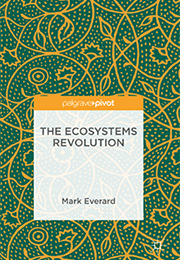The principal element of my first degree, when ecology was still a relatively new subject, was entitled Ecosystems and Man and Mark Everard’s latest work provides a fascinating compendium of the intellectual revolution that has occurred over the decades since then. This book weaves the concepts of sustainability, biodiversity and ecosystem services, terms so familiar now but unheard in academia in my day, with what many of us are practising in our professional activities as we work with anthropically transformed ecosystems. It is a clarion call for much greater integration of the human condition with the planetary biosphere that keeps our species alive, but of which so many, particularly those in government, seem almost totally unaware.
The structure of this generously-referenced discourse is logically and carefully crafted, as would be expected from such an eminent scientist. It is not a work for the beginner or lay reader: the vocabulary and concepts are scholarly but will not be beyond the higher-level science student or, indeed, IES members, especially those with a sound grounding in the life sciences.
 The Introduction is a useful synopsis of the main text, running briefly but succinctly through the contents of its chapters. There is also a useful index, invaluable for those not acquiring the excellently presented digital version. The effort spent in Chapter 1, emphasising the primacy of the role of micro-organisms in our planet’s ecology, the huge gaps in our knowledge in their regard and their importance to us, is fundamental to the successful communication of the author’s theme. This is nicely set within the traditional framework of biomes, biogeochemical cycles and the rest of the ecological science terminological menagerie with which we are familiar, emphasising evolution’s reactive nature to anthropogenic change (and humanity’s indivisibility from planetary ecology and eco-systemic interdependence — Chapter 2), the consequences of which we are seeing in our troubled world.
The Introduction is a useful synopsis of the main text, running briefly but succinctly through the contents of its chapters. There is also a useful index, invaluable for those not acquiring the excellently presented digital version. The effort spent in Chapter 1, emphasising the primacy of the role of micro-organisms in our planet’s ecology, the huge gaps in our knowledge in their regard and their importance to us, is fundamental to the successful communication of the author’s theme. This is nicely set within the traditional framework of biomes, biogeochemical cycles and the rest of the ecological science terminological menagerie with which we are familiar, emphasising evolution’s reactive nature to anthropogenic change (and humanity’s indivisibility from planetary ecology and eco-systemic interdependence — Chapter 2), the consequences of which we are seeing in our troubled world.
Far from the diet of doom-and-gloom to which we have become habituated, though, this is in essence an optimistic book of opportunity, perhaps verging a little on the teleological, but proposing the chance of greater security and wellbeing for us all. Following an erudite walk through human societal evolution and its component revolutions in Chapter 3 and a treatise on natural selection (Chapter 4), whilst recognising today’s daunting threats to the whole biosphere and the signs of generalised ecosystem collapse, the scene is set for the next, hopefully better-understood and more wisely managed, revolution — the core of the book.
Chapter 5 thus becomes a refreshing account of ecological regeneration that is actually happening around the world — patchy, usually unreported and on too small a scale, but a bright ray of hope for the future nonetheless, if we can but nourish and sustain the philosophy to result in a sufficient level of accomplishment. For instance, there is discussion of SuDS and Green Infrastructure with catchment-based water treatment and conservation as they relate to ecosystem services, which will be familiar ground to IES members, touching on the matter of recurrent flooding we are seeing so often today and its relationship to ecosystems management. This leads into the need to restore and rejuvenate our degraded habitats on a scale far more ambitious than is the case presently and the benefits that will accrue, opposing forces of human overpopulation and today’s market-driven economic model notwithstanding. Too much rhetoric and not enough appropriate action trenchantly sums up the author’s conclusion to this section.
In Chapter 6, the third word of the title comes to the fore. The fallacies and dangers in the workings of the current world economy are laid bare, whilst the green shoots of a more durable and less auto-destructive approach, with greater social and environmental accountability and transparency, are described. Here, Mark Everard prudently resists the common trend of decrying everything, preferring to offer positive alternatives supported by cogent argument and forward thinking. The coverage is wide-ranging with business, energy, urban design, transport, agriculture & food, health & wellbeing, culture, local government, international development, defence, foreign policy, research & education and systemic connections across policy areas as soubriquets.
Bringing together the threads of those preceding, the concluding chapter returns to the passing of ages from Holocene to Anthropocene to a putative “Symbiocene”, a synergy of humanity and nature positively directed by humankind wisely applying the ecological knowledge we now have. Not only is the theory carefully expounded but useful tools and processes for effective action are set out. The author provides powerful arguments to those of us struggling to apply relevant ecology to our work when we face the energy-sapping resistance of entrenched bureaucracy, a dearth of scientists in senior government posts, and the big bucks of those myopically bent only on short-term financial gain.
Stephen Hawking was right when he said recently that we have to change the way we think about money. So too, the EU Referendum outcome in Britain was a clear illustration of the failure by so many to have even the most basic ecological understanding of the world we inhabit and the crucial need to collaborate. Whether the required social sea change in politics, religion, education and the attitude of many cultures to the female half of their population to avert the forces presently corroding our planetary homeostasis will happen, is moot. But we have to try and Mark Everard’s thoughtful optimism in The Ecosystems Revolution is infectious.
This is an important and useful book and I would recommend it as required reading for all local planners, government ministers, university science students and environmental practitioners.
The Ecosystems Revolution
Mark Everard (author) | ISBN: 978-3-319-31658 | Published: July 2016 | Publisher: Palgrave Macmillan





